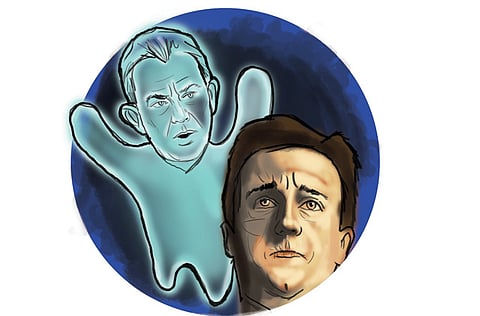Blair's ghost returns to haunt Cameron
The Economist writes: Right advice to British PM who leads a sceptical nation to war against Gaddafi would be to stick to achievable goals

A month ago, David Cameron shuttled from Egypt to Kuwait, Qatar and Oman to explain why — in his response to the spreading protests of the Arab spring — he would not be Tony Blair. He did not use quite those words. Instead, Britain's prime minister portrayed himself standing midway between two foolish extremes.
On one side were the "naive neoconservatives" who thought that democracy could be dropped from a bomb bay at 40,000 feet (hello, Mr Blair). On the other, generations of suave Foreign Office types, murmuring that "Arabs or Muslims can't do democracy", and that stability is all.
Instead Cameron announced an alternative, middle path. His government would not press for instant democracy everywhere, but would urge Arab leaders to grant basic rights — free speech, the right to free assembly and the rule of law — precisely because denying people such rights was a recipe for instability. At the time, it was concluded that this strategy was not so much a diplomatic third way as a bet on events: a low-key version of neoconservatism, wagering that gradual reforms would bring more stability than despotism.
One month on, events in Libya have outrun the prime minister's cautious middle way. Cameron's modest ambitions — standing up for the right of ordinary Arabs to voice their hopes and frustrations — find him transformed from pragmatist to war leader. To adapt the prime minister's own schema, he finds himself defending the most basic rights of Libyans, namely freedom from brutal repression and the right to self-determination, with bombs dropped from 40,000 feet.
So is Cameron perforce adopting Blair's doctrine of liberal interventionism? He insists not. "This is not another Iraq," he told Parliament on March 21, in a six-hour debate filled with theatre designed to convey that point, from Cameron's patience with backbench interventions to the sight of the attorney-general sitting at his side (government legal advice approving the Libya action was summarised for MPs in an official note).
Cameron pointedly calls the military action in Libya "necessary, legal and right". Yet that same neat tricolon captures something more complex than an outright rejection of the Blair doctrine. Parsed carefully, its three elements signify, in order: "not like Blair, definitely not like Blair — and a rather Blair-like argument for war".
If Britain lost a good deal of innocence in Iraq, that unhappy war has not eradicated the appeal of "doing the right thing" for the political class. Even after Iraq, pacifism does not occupy the moral high ground in British politics. Two broad reasons were cited as MPs endorsed military force against Muammar Gaddafi, by 557 to 13 votes. The first, which united the Conservative-Liberal Democrat coalition with most of the Labour Party, cast the use of military force as a response to a humanitarian emergency. America, France and Britain had been in a "race against time" to prevent a slaughter of civilians in Benghazi, Cameron told Parliament. Supporting the government, the Labour leader of the opposition, Ed Miliband, drew comparisons with the Holocaust and the Spanish civil war. Yet the public, wearied by years of entanglement in Iraq and Afghanistan, seems queasiest about the Libya mission when it is cast in purely altruistic terms. A poll asking if British forces should risk death or injury to protect Libyan rebels from Colonel Gaddafi found 53 per cent opposed. Unsurprisingly, Cameron is keen to assure British voters this mission is not merely an outbreak of do-goodery, but also "hard-headed" (a favourite Cameron phrase), rooted in national interests, and limited in scope.
The prime minister's sincerity is proved by the political risks he has run, British sources argue. He has bound his fate to France's Nicolas Sarkozy, an alarmingly mercurial figure. What is more, when Cameron decided to join the French drive for a UN Security Council resolution authorising military strikes, he didn't know "where the Americans were going with this", sources say. Remarkably, they add, Barack Obama's decision-making had been so opaque that when America tabled strong language extending the draft's scope, Britain half-feared a bid to wreck the resolution by attracting a veto. The prime minister's contention is that the moral and pragmatic spurs to action are complementary. Alas, in Libya, a humanitarian approach and the cold-eyed pursuit of national interests might yet come to seem in tension. Asked how he thinks the Libyan mission will end, Cameron can only offer a fudge.
Paradoxically, if this mission is essentially humanitarian, Britain's commitment really is limited, as Cameron promises: do-gooders can always harden their hearts and walk away. In contrast, if Cameron truly believes that Libyan instability directly threatens British interests, then his commitment will be guided by events on the ground.
Stopping a massacre in Benghazi was the right thing to do. From now on, this gets harder. A thoughtful new Tory MP, Rory Stewart — a former soldier and diplomat, familiar with Iraq and Afghanistan — urged Cameron to stick to modest, achievable goals and humble language. It was good advice. The opposite certainly did for Blair.


